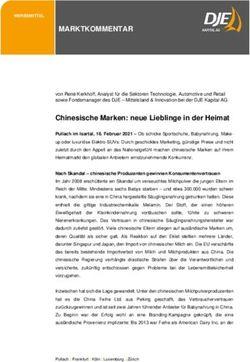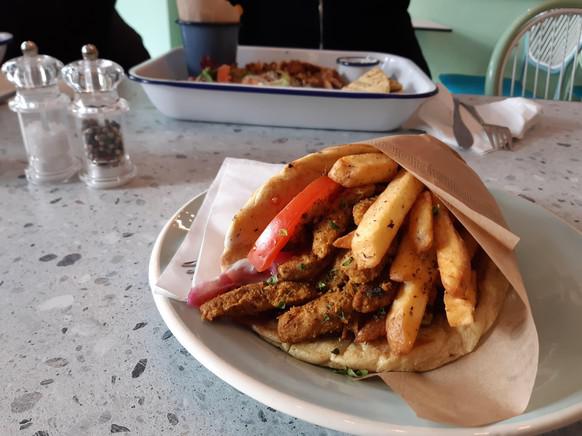
After scandal – Chinese producers win consumer confidence
In 2008, a scandal involving contaminated milk powder shook young parents in China. At least six babies died - and about 300,000 became seriously ill after drinking Chinese-made infant formula. This contained the toxic industrial chemical melamine. The substance, which was supposed to simulate a higher protein content in baby food, led to severe kidney diseases. Confidence in Chinese baby food manufacturers was deeply disturbed as a result. Many Chinese parents switched to foreign brands whose quality was considered safe. In response to the scandal, several countries including Singapore and Japan stopped importing Chinese milk. The EU tightened the already existing import ban on milk and milk products from China. The Chinese government imposed drastic penalties on those responsible and promised to take decisive action against food safety problems in the future.
In the meantime the situation has changed. Among the Chinese milk powder producers, China Feihe Ltd. from Beijing managed to win back consumer confidence and has been the leading supplier of baby food in China for two years. Initially, the success was probably linked to a branding campaign that implied foreign provenance: until 2013, Feihe was listed on the New York Stock Exchange as American Dairy Inc. Reverting to its Chinese name, Feihe emphasizes that the domestic baby food has the highest quality in history and is comparable to that of leading global brands. The advertisement also promises that their product is better suited to the needs of Chinese babies than foreign products.
Increasing competitive pressure for global market leaders
Globally leading suppliers of baby food such as Nestlé or Danone are now subject to greater competitive pressure from local suppliers on the Chinese market than just a few years ago. Corona has further accelerated this development. During the course of the pandemic, the Chinese government massively restricted the so-called daigou trade - meaning a person outside of China buys goods for a person living in China. As a result, the high growth rates of the past at Nestlé and Co. could not be maintained. The declining birth rate in China did the rest.
Improved quality of Chinese products
Whether it's baby food, mineral water, sportswear or skin cream - the domestic brands in China are competing with the well-known brands of global corporations. In terms of quality, the Chinese providers have now caught up massively in practically all sectors. Sports shoes from leading Chinese manufacturers such as Anta Sports are comparable in quality to products from Nike, Adidas and Co., but are often much cheaper. In 2020, for the first time, a local producer made the most popular sneaker - for a certain time. But it wasn't just the improved quality. In recent years, increasing national awareness (“Buy Chinese” or “Buy Chinese”) has given impetus to local products.
The corona pandemic is intensifying change
The Covid-19 pandemic has also reinforced this change. In times of tight or uncertain household budgets, the attractiveness of cheaper goods increases and the locally manufactured products usually cost significantly less than those of foreign brand suppliers. In addition, local brands are usually better positioned on the leading Chinese online platforms. As these platforms have seen a surge in popularity during the pandemic, the multinationals are finding it increasingly difficult to market and sell to Chinese brands.
Premium segment – still dominated by foreign manufacturers
Market researchers confirm: Chinese buyers now have greater trust in local brands. According to Daxue Consulting, local companies now make up seven of the top ten cosmetics brands. In 2017 there were only three. Up-and-coming Chinese brands such as the cosmetics suppliers Perfect Diary or Yatsen have a digital presence from day one, for example at Tmall, an online retailer of the Alibaba Group, and invest heavily in marketing via social media channels. That squeezes the profit margin. Yatsen, for example, has an operating margin of only about 5 percent. Multinational companies such as Estée Lauder and L'Oréal also invest a great deal in their online offerings, but are clearly focusing on the much more profitable premium segment. Against this background, the loss of market share by L'Oréal's Maybelline make-up line in the Chinese mass market of around 10 percent since 2010 is not surprising. At the same time, however, L'Oréal has successfully established two new make-up brands in the premium segment, Yves Saint Laurent and Giorgio Armani, and has gained around 15 percent market share over the past five years. It is therefore only likely to become dangerous for Western cosmetics manufacturers if their Chinese competitors also penetrate the much more lucrative and faster-growing premium segment for skin care. So far, L'Oréal has been able to assert itself very well here with the Lancôme brand.


For the Chinese taste
The Chinese companies' marketing resonates with the locals. While the foreign brand touts the nutritional value of its infant formula, the local brand Feihe maintains relationships with consumers through loyalty programs, support groups for new parents, or books of bedtime stories. And Chinese brands are increasingly adapting their goods to local tastes. China Mengniu Dairy Co., for example, increased sales of its dairy products with innovations such as pineapple-flavored cheese and squid snacks, in addition to the basic offerings of milk and fruit yoghurt.
Few international corporations are as agile and operate with innovative sales strategies. For example, on China's Singles' Day 1 , Estée Lauder sold products for more than 2 billion yuan (more than 250 million euros) with a live-streaming campaign, two-for-one discounts and installment plans. And US fast-food chain Kentucky Fried Chicken (KFC), which specializes in poultry -- still the largest in China -- supplemented its fried chicken for customers stuck at home during the pandemic with items like quick-cooking, sour snail noodles. Foreign brands still dominate in high-price categories such as exclusive handbags and luxury cars. But car manufacturers in particular have to be careful.
Car market: The lead of German top brands is melting
China is by far the largest car market in the world - and therefore a key market for German manufacturers. These have a very good reputation. So far, the Chinese have been keen to buy top-of-the-range luxury models, and German manufacturers are much more profitable in China than in Germany. However, according to a recent survey, the trendiest car in China is no longer a Porsche or Tesla, but an NIO. The brand has only been around since 2014 and cannot (at least not yet) compete with European brands in terms of tradition and radiance. Nevertheless, NIO has made a giant leap in terms of quality and design with its electric SUV, offers a decent range and is significantly cheaper than a comparable model from BMW. The competitive pressure on European manufacturers is increasing due to Chinese suppliers.
Chinese car brands score with innovative business models
NIO is not alone. Other Chinese automakers such as BYD, BAIC and Geely are currently pushing their way onto the market with new e-cars. They not only beckon with modern technology and lower prices, but also break new ground. This saves the three-year-old Geely subsidiary Lynk & Co an expensive sales network. Configured and ordered online. As an alternative to purchasing, Lynk also offers a low-cost subscription package including maintenance, taxes and insurance, with which subscribers can share their car with third parties and earn money as well. Aiways is also starting with an unusual concept for its electric SUV. Thanks to the new battery technology with a long range, it comes up with a competitive price even in sub-zero temperatures - and not only in China. In Europe, customers can test drive the car at the branches of the electronics retailer Euronics. Orders are placed online and Aiways has teamed up with the automotive accessories and car parts dealer ATU for maintenance, which operates a wide workshop network. The heart of e-mobility is the battery. Therefore, car manufacturers need a partnership with successful and innovative battery manufacturers. One of the world's leading battery manufacturers is called CATL and is based in China - a possible advantage for Chinese car brands.
Chinese providers are catching up – and offer interesting investment opportunities
Western brands are still held in high esteem in China. However, Chinese suppliers have caught up massively across all sectors or are in some cases a nose ahead of their foreign competitors in terms of marketing and sales or even technically. E-mobility is just one example of this. “Buy Chinese” is also well received by Chinese customers. This expands the possibilities for investors to invest in the Chinese domestic market.
René Kerkhoff, analyst for the technology, automotive and retail sectors and fund manager of DJE - Mittelstand & Innovation at DJE Kapital AG
1 Singles' Day is a day for single people, which is celebrated in China on November 11th - flanked by suitable advertising: for example for restaurants, karaoke bars and online shops. This made Singles' Day the biggest online shopping day in the world.







